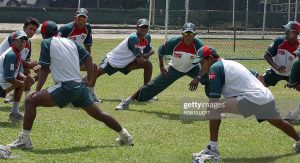by: Chidi Onwuka, Undergraduate Student
Static stretches prior to a workout are good for performance. To stretch before exercise actually loosens muscles that are being engaged and promotes faster muscle response during a workout. Stretching before exercising may reduce the risk of injury. These are all examples of exercise myths that have been thrown around the internet as one of the millions of ways to help improve physical activity results and performance. The particular myth of stretching prior to exercise being beneficial seems logical when you think about it. The goals of stretching to keep the muscles flexible, strong and healthy as well maintaining and improving your range of motion are all true statements. However, it has been proven that stretching prior to an exercise can actually be detrimental to your body instead of a benefit. In this discussion I will go into more detail as to how the myth of stretching before exercise to help improve results has in fact been proven to be incorrect. I
At one point in time, stretching was to exercise as being engaged is to getting married. Stretching was a necessary obligation that should be completed prior to any physical activity or exercise. Athletes used to be warned to stretch their muscles before performing physical activity to avoid or reduce the risk of injury. It has been proven though that static stretching, in particular, actually impedes progression and performance. Runners run slower, jumpers don’t jump as high, weight lifters aren’t as strong when stretching prior to exercise. If only I had known this in high school, I may have been to jump higher, and I would not have missed that fast break dunk attempt I had in that game against Putnam City.
Stretching prior to exercise to relax muscles and promote faster response makes perfect sense, but studies have shown and concluded that stretching is ineffective in the reduction of injuries and improving performance. Yes, stretching does lengthen the muscle engaged, but stretching before a workout can actually weaken the muscles. According to Nelson, (2005) “pre-event stretching has demonstrated an inhibitory effect on maximal force or torque production, vertical jump performance, and running speed “(Nelson, 338). The only thing I would want to inhibit muscle strength before, during or after exercise would be the use of resistance bands which actually achieves the goals of increasing performance rather than decreasing it if they are used properly.
Bangladeshi Cricket team about to lose stretching prior to exercise??
ROB ELLIOTT/AFP via Getty Images
Stretching prior to exercise to prevent injury is another aspect of this myth that has been proven to be untrue with research. Static stretching could actually open you up to injury due to the lengthening of the muscle fibers, and then applying force and torque on those muscles during the main event of your workout or activity. A very long time ago I used to instruct my boys to stretch before games to prevent injury, and it was during that period in which I dealt with more injuries than usual for kids at that age. Fortunately for me, I have learned from my past mistakes and am better for them. Unfortunate for the kids that were on my team at the time that I that I was training them incorrectly, and glad that no one of the kids had an serious injuries from it.
Stretching PRIOR to exercise. Stretching as a whole is beneficial if done the right way and at the right times. Dynamic stretching as opposed to static stretching is recommended prior to a workout or game. Dynamic stretches such as leg kicks, arm circles and squats accomplish the goals of warming up the muscles, getting them prepared for performance, and are great pre-workout. Static stretches are great post-exercise or post-workout. Once your muscles are warmed up, and you are relaxing the muscles instead of engaging the muscles is when static stretching is best. So please do not take parts of this entry, and quote me without the full text. Again, stretching is good for the muscles as long as it is done correctly and at the right times.
References
- Nelson, Arnold G, Kokkonen, Joke, & Arnall, David A. (2005). ACUTE MUSCLE STRETCHING INHIBITS MUSCLE STRENGTH ENDURANCE PERFORMANCE. Journal of Strength and Conditioning Research,19(2), 338-343.
